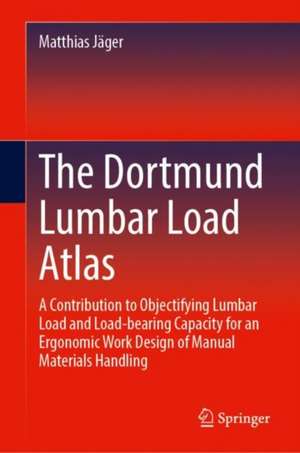The Dortmund Lumbar Load Atlas: A Contribution to Objectifying Lumbar Load and Load-Bearing Capacity for an Ergonomic Work Design of Manual Materials Handling
Autor Matthias Jägeren Limba Engleză Hardback – 8 mar 2023
Manual materials handling is understood to be the holding, lifting or lowering, pulling or pushing as well as carrying of load objects and thus the application of forces mostly with one or both hands on the item handled. Due to the biomechanical similarity, special handling tasks are also addressed, such as shoveling bulk material, transporting goods via wheelbarrow and moving people manually in the care sector.
The book aims to promote interest in biomechanical approaches and provides information to all persons involved in the design, evaluation and redesign of manual materials handling, e.g. ergonomists, occupational physicians, orthopaedists, employers or researchers, lecturers and students. This handbook enables analysis of manual materials handlings regarding potential lumbar overload and contains the following:
- a comprehensive collection of data on lumbar load in typical manual materials handling activities—a load register on interbranch activities,
- synopses of previously analysed biomechanically challenging occupational activities—a load register on branch-specific activities,
- explanations of the methodological approach to predicting moments and forces as well as their components in relation to the lumbar spine via biomechanical modelling and
- criteria for the evaluation of load data with regard to potential lumbar overloading during single operations, working shifts and the entire occupational life.
| Toate formatele și edițiile | Preț | Express |
|---|---|---|
| Paperback (1) | 873.02 lei 38-44 zile | |
| Springer International Publishing – 8 mar 2024 | 873.02 lei 38-44 zile | |
| Hardback (1) | 1403.52 lei 3-5 săpt. | |
| Springer International Publishing – 8 mar 2023 | 1403.52 lei 3-5 săpt. |
Preț: 1403.52 lei
Preț vechi: 1711.62 lei
-18% Nou
Puncte Express: 2105
Preț estimativ în valută:
268.56€ • 281.15$ • 222.22£
268.56€ • 281.15$ • 222.22£
Carte disponibilă
Livrare economică 15-29 martie
Preluare comenzi: 021 569.72.76
Specificații
ISBN-13: 9783031063480
ISBN-10: 3031063481
Pagini: 580
Ilustrații: XVI, 580 p. 288 illus., 64 illus. in color.
Dimensiuni: 155 x 235 mm
Greutate: 1.09 kg
Ediția:2023
Editura: Springer International Publishing
Colecția Springer
Locul publicării:Cham, Switzerland
ISBN-10: 3031063481
Pagini: 580
Ilustrații: XVI, 580 p. 288 illus., 64 illus. in color.
Dimensiuni: 155 x 235 mm
Greutate: 1.09 kg
Ediția:2023
Editura: Springer International Publishing
Colecția Springer
Locul publicării:Cham, Switzerland
Cuprins
Introduction.- Biomechanical basics.- Lumbar-load register for interbranch activities.- Lumbar-load register for previous branch-specific examinations.- Biomechanical evaluation – criteria of overload.
Notă biografică
Matthias Jäger, Leibniz Research Centre for Working Environment and Human Factors (IfADo) at Dortmund University of Technology (Germany), studied Electrical Engineering at the Ruhr-University of Bochum (Germany) and moved as a research associate in 1981 to the Ergonomics Department of IfADo. He received his doctoral degree from the Faculty of Mechanical Engineering of the University of Dortmund in 1986 and his habilitation degree with the venia legendi for ergonomics in 2001. He lectured, among others, at the University of Dortmund and the ETH Zurich. At IfADo, he initiated the Dortmund Lumbar Load Study Group in 1995 and became the head of the project group Biomechanics in 2004. A particular interest concerns the dissemination of knowledge via standards (ISO, CEN, DIN), guidelines (WHO, DGAUM Occupational Medicine, GfA Work Science) and as the editor-in-chief of a peer-reviewed journal (Zentralblatt Arbeitsmedizin).
Textul de pe ultima copertă
This handbook supports the identification of inappropriate work design in manual materials handling and thus the prevention of overloading the body and of the development of health disorders. The approach at hand, The Dortmund Lumbar Load Atlas, is focussed exclusively on biomechanical aspects of loading, overload criteria and signs of overloading in the form of verifiable low-back diseases due its strikingly frequently affectedness.
Manual materials handling is understood to be the holding, lifting or lowering, pulling or pushing as well as carrying of load objects and thus the application of forces mostly with one or both hands on the item handled. Due to the biomechanical similarity, special handling tasks are also addressed, such as shoveling bulk material, transporting goods via wheelbarrow and moving people manually in the care sector.
The book aims to promote interest in biomechanical approaches and provides information toall persons involved in the design, evaluation and redesign of manual materials handling, e.g. ergonomists, occupational physicians, orthopaedists, employers or researchers, lecturers and students. This handbook enables analysis of manual materials handlings regarding potential lumbar overload and contains the following:
Manual materials handling is understood to be the holding, lifting or lowering, pulling or pushing as well as carrying of load objects and thus the application of forces mostly with one or both hands on the item handled. Due to the biomechanical similarity, special handling tasks are also addressed, such as shoveling bulk material, transporting goods via wheelbarrow and moving people manually in the care sector.
The book aims to promote interest in biomechanical approaches and provides information toall persons involved in the design, evaluation and redesign of manual materials handling, e.g. ergonomists, occupational physicians, orthopaedists, employers or researchers, lecturers and students. This handbook enables analysis of manual materials handlings regarding potential lumbar overload and contains the following:
- a comprehensive collection of data on lumbar load in typical manual materials handling activities—a load register on interbranch activities,
- synopses of previously analysed biomechanically challenging occupational activities—a load register on branch-specific activities,
- explanations of the methodological approach to predicting moments and forces as well as their components in relation to the lumbar spine via biomechanical modelling and
- criteria for the evaluation of load data with regard to potential lumbar overloading during single operations, working shifts and the entire occupational life.
Caracteristici
Provides extensive load data spectrum for diverse holding, lifting, pulling, pushing, and carrying of objects Presents load-bearing criteria of the lumbar spine for individual actions, daily work, and exposures Discusses prevention of biomechanical overload and lumbar spine diseases through manual materials handling
